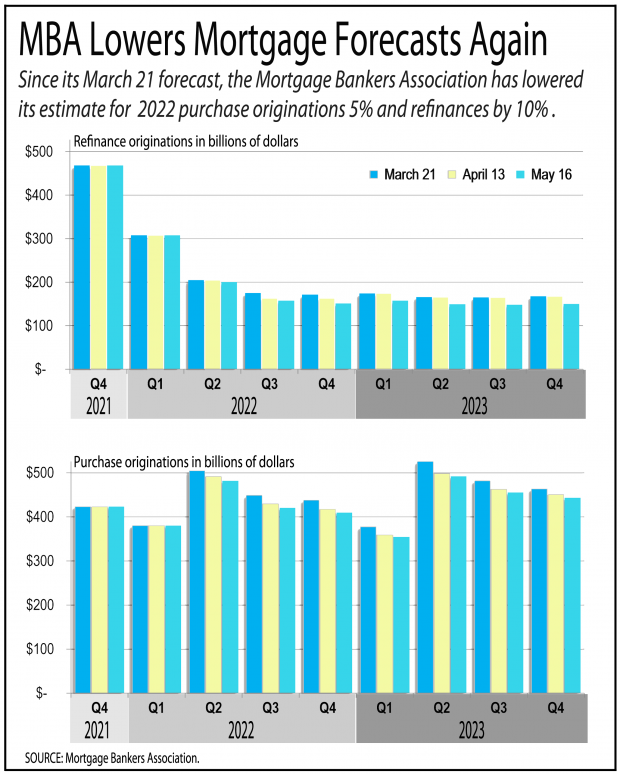Mortgage Boom Is Over, MBA Drops Originations Forecasts Again. The president of the MBA tells lenders to focus "on scaling down."

The Mortgage Bankers Association on Monday lowered forecasts again for originations – for both this year and next, and for purchases and refinancings.
Bob Broeksmit, the MBA’s president/CEO, told lenders Monday that the mortgage boom of the last two years is over, and now lenders need be ready to handle smaller volumes.
“After the stratospheric heights of 2020 and 2021, the market is coming back down to earth,” Broeksmit said in prepared remarks for those attending the MBA’s 2022 Secondary & Capital Markets Conference & Expo in New York.
“To a certain extent, the headwinds we expected have finally arrived,” he said. “Rising rates are putting pressure on new loans and refis, and after ramping up, the focus is now on scaling down.”
The May 16 forecast, which was released separately, showed MBA analysts have lowered their expectations of economic growth and sales of existing homes, while raising their expectations for mortgage interest rates.
The result is not only lower refinance volume, but also lower purchases.
Broeksmit told lenders at the conference that the MBA’s analysis still retained a “cause for hope.”
“First and foremost, markets have already priced in the bulk of the anticipated rate increases from the Federal Reserve,” Broeksmit said. “We don’t anticipate mortgage rates will rise much higher than they currently are. They’ll plateau very soon if they haven’t already, albeit with significant volatility.”
While the number of purchase transactions will fall 8% to 1.7 million this year, the value will rise to a record because of the steady increase in home prices, Broeksmit said.
Lenders are expected to originate $1.69 trillion in purchase originations this year, up 2.9% from 2021. Purchase originations are expected to rise 3.1% to $1.75 trillion in 2023. But those originations are about 5% lower than in its March 21 forecast.
Refinances were expected to fall steeply this year, and the new forecasts mean they are falling even faster and deeper.
The MBA now forecasts refinances will fall 65% to $819 billion this year, and fall another 26% to $608 billion in 2023. The MBA has lowered its refinance originations for this year by about 5% since its March 21 forecast. Refinance originations for 2023 were left untouched in the April 13 forecast, but were chopped by 10% in the May 16 forecast.
Last month, the National Association of Realtors reported existing home sales fell for the second row in March. Sales fell 2.7% from February to a seasonally adjusted annual rate of 5.77 million in March. Over the previous 12 months, sales fell 4.5%.
Lawrence Yun, the NAR’s chief economist, said the drops showed the housing market is responding to sharply higher mortgage rates and inflation is sapping purchasing power. While homes continue to sell rapidly and prices are still rising at double-digit rates, Yun said sellers should not expect the easy-profit gains and should look for multiple offers to fade as demand continues to subside.
Comments
Post a Comment
Please no profanity or political comments.